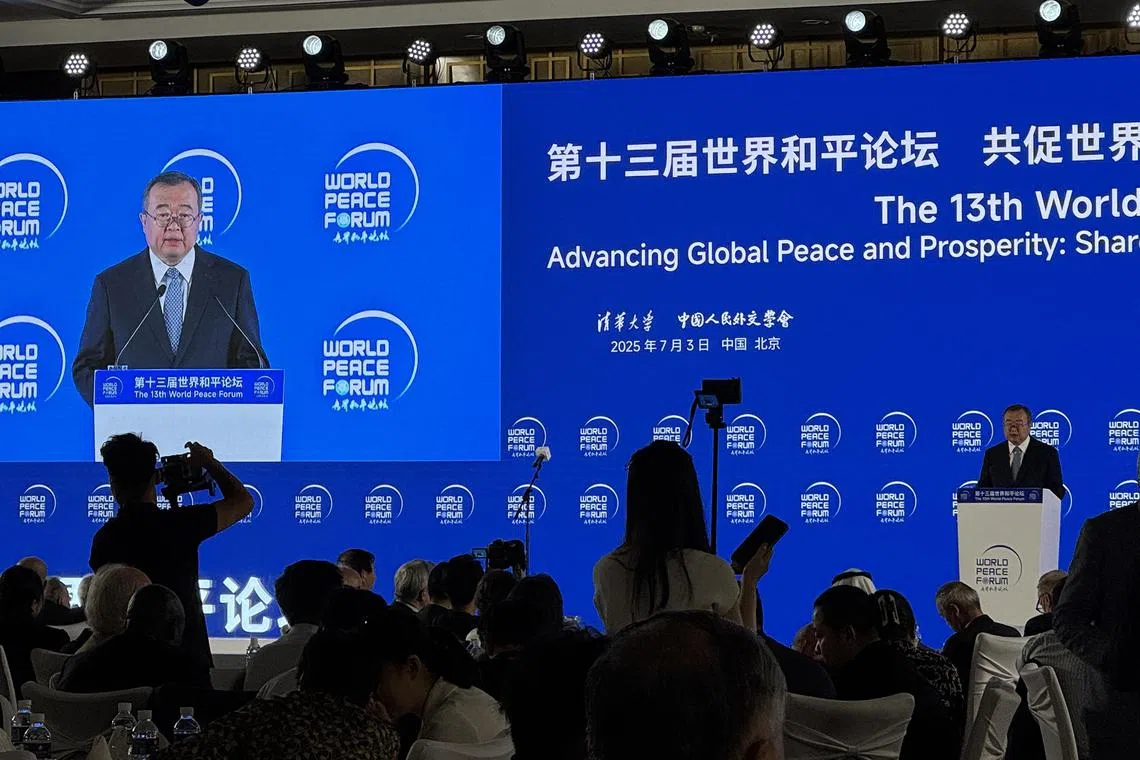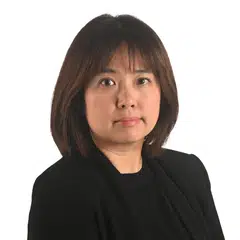War between China, US inconceivable and avoidable, says top Chinese official
Sign up now: Get insights on Asia's fast-moving developments

Mr Liu Jianchao, head of the Communist Party of China's International Department, speaking at the World Peace Forum in Beijing on July 3.
ST PHOTO: YEW LUN TIAN
BEIJING – War between China and the United States is not inevitable and even unthinkable, a senior Communist Party of China (CPC) official has said, in one of Beijing’s clearest rejections yet of the notion of conflict between the world’s two largest powers.
“People often say that a war between China and the US is inevitable, but I don’t think so,” Mr Liu Jianchao, head of the party’s International Department, told an international audience of current and former foreign policymakers and scholars at the World Peace Forum in Beijing on July 3.
He described Chinese and Americans as peace-loving people and said it would be “inconceivable” that China and the US would want to meet on the battlefield.
“So we advise those politicians who advocate force and admire muscle-flexing to give up their belligerent rhetoric and stop instigating conflicts and contradictions,” he said.
Earlier in his opening remarks, he criticised US Defence Secretary Pete Hegseth’s speech
In that speech in June, Mr Hegseth emphasised his country’s commitment to the Indo-Pacific region
Mr Liu described Mr Hegseth’s message as a “new incarnation of a hegemonic mindset”.
“What he really wants is force, not dialogue, and to provoke confrontation, not peace and harmony,” Mr Liu said of Mr Hegseth.
“If we are still obsessed with zero-sum games and absolute security,” he warned, “the people of the world may face a predicament that is not about who loses and who wins, but about destruction for all – a price that human civilisation cannot bear.”
The strategic rivalry between the US and China has intensified in recent years, especially after Mr Trump returned to the White House in January
Competition spans from trade and technology to security and ideology.
Mr Liu, who is the CPC’s equivalent of foreign minister, stressed that China wants to develop peacefully.
He pointed out that a secure and stable external environment is essential for the party’s ability to rule the country.
“Hence, China will never export turmoil and strife, as that will lead to a self-destruction of the wonderful opportunities to develop,” he said.
He called on leaders to act with responsibility and conscience in choosing a shared future over zero-sum games.
“History will judge our generation not by how many wars we have won, but by whether we have kept the peace and brought happiness to our people,” he said.
Speaking at the opening of the forum, China’s Vice-Premier Han Zheng reiterated that as a responsible big power, China has always been “a builder of world peace, a contributor to global development and defender of international order”.
At another session at the forum, Mr Cui Tiankai, a former Chinese ambassador to the US, stressed that China never set out to compete with the US.
“Our developmental goal is not to put anyone down or to replace anyone, but to surpass ourselves,” he said.
Pointing to China’s stance against Soviet hegemony in the 1960s, Mr Cui argued that Beijing’s opposition to hegemonic power is not limited to the US.
“It is a mistake to think that Sino-US rivalry means that China is competing with the US for supremacy. We do not compete with anyone for supremacy, we are in fact against hegemony by any country,” he said.
Speaking at the same panel as Mr Cui, Singapore’s former foreign minister George Yeo did not hide his disdain for the pressuring tactics of Mr Trump.
“The US is no longer strong enough to be a global supremo. But it is strong enough to be a bully, especially to those who are weak,” he said.
He cited how Mr Trump pressed Ukraine to sell minerals to the US
“He is threatening people he can threaten,” he said.
“He is nice to Xi Jinping because he knows he cannot bully Xi Jinping,” said Mr Yeo, referring to the Chinese President.
Earlier Mr Liu said, when asked by a journalist about the future of US-China ties: “I’m optimistic.”



